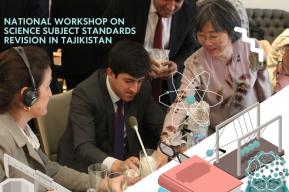Article
Republic of Korea: The fourth National Lifelong Learning Promotion Plan (2018–2022), issued in 2017

Rationale
The Lifelong Education Act of the Republic of Korea (2009) calls on the Ministry of Education to develop a comprehensive lifelong education promotion plan every five years at the national level. This national plan proposes mid- and long-term policy objectives and a basic direction for lifelong education promotion. Since 2009, three plans have been enacted, resulting in improved access to lifelong education and the creation of the National Institute for Lifelong Education (NILE) as well as 17 local Lifelong Education Institutions. The digital age has led to considerable transformations in the cultural, social, economic and political environment. The fourth National Lifelong Learning Promotion Plan (2018–2022) therefore seeks to develop a flexible and high-quality lifelong learning system in response to technological innovation, the Fourth Industrial Revolution, and social changes like the population structure (aging society), an increase in life expectancy and changes in the professional world.
Concept of lifelong learning
The fourth National Plan subscribes to the definition of lifelong learning that is proposed in the Lifelong Education Act (2009): ‘[lifelong learning encompasses] all types of systematic educational activities other than regular school curriculums, including supplementary education for educational attainment, basic literacy education for adults, occupational ability enhancement education, humanities and liberal education, culture and art education, and citizen’s participation education.’
The plan also details why lifelong learning is important for the Republic of Korea:
1. Lifelong learning is the most efficient investment for growth;
2. Lifelong learning is the most effective welfare policy to eliminate polarization;
3. Lifelong learning ensures basic learning rights and improves life satisfaction of the people.
Main challenges
The Republic of Korea has made numerous and important advances in lifelong learning and the rate of participation in lifelong learning has steadily increased, from 26.4 per cent of the population taking part in some kind of lifelong learning programme in 2008 to 35.8 per cent in 2017. However, the country still stands below the OECD (Organisation for Economic Co-operation and Development) average of 40.4 per cent. The principal challenges that the government still faces include:
- variations in participation rates according to educational background and income. A problem persists in reaching those members of society who earn less, are illiterate or who have abandoned their studies;
- programmes need to be updated so that they relate to social, economic and cultural changes and include new ways of online learning.
- There are wide variations in funding investment for lifelong education within local governments.
Main targets and measures
The aim of the fourth National Plan is to promote a sustainable lifelong learning society and support the implementation of four Ps (people, participation, prosperity and partnership); it does this by ensuring:
Lifelong learning for every citizen:
- Guaranteeing the right to lifelong learning for employees and promoting the training of adult educators and lifelong learning instructors;
- Expanding educational opportunities to all citizens who wish to develop their literacy skills;
- Promoting practical lifelong learning opportunities for the underprivileged and disabled through a voucher scheme that reduces costs to learners.
Increased opportunities for working-age adults:
- Making improvements to the K-MOOC (Korean Massive Open Online Course) platform and the National Lifelong Learning Portal;
- Expanding adult education opportunities in higher education institutions;
- Establishing professional colleges as hubs for vocational and lifelong education and institutionalizing the linkage of secondary and higher vocational education;
- Supporting employment and entrepreneurship programmes.
Access to lifelong learning everywhere:
- Expanding the network of lifelong learning centres while taking into consideration local conditions and facilities that can be reutilized;
- Supporting community-based lifelong learning through the strengthening of civic competencies on a regional scale;
- Promoting the relationship between lifelong and vocational education;
- Creating specialized non-degree courses that respond to local needs and foster local talent;
- Developing more on- and offline courses to enhance understanding of environmental values, safety consciousness and disaster response.
High-quality lifelong learning with strong foundation:
- Promoting the development of institutional evaluation and a certification system;
- Improving the quality of lifelong education statistics;
- Encouraging expansion of international cooperation in lifelong education and special foreign language education;
- Establishing strategic plans and guidelines in order to expand investment in and resources for lifelong education promotion.
Stakeholders involved in the development of the document
Stakeholders responsible for implementation
- Ministry of Education
- Ministry of Employment and Labor
- Ministry of Strategy and Finance
- Ministry of Health and Welfare
- Ministry of Gender Equality and Family
- Ministry of National Defence
- Provincial lifelong education institutes
Issuing Body
Ministry of Education










